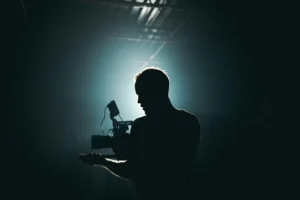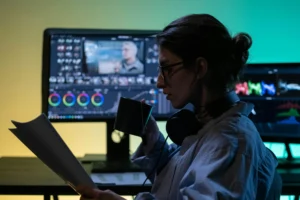Experimental Film Production Companies
Changing the Way Movies Are Made One Frame at a Time
Experimental cinema is a daring and mysterious part of the huge world of filmmaking. It goes against the rules of storytelling, goes against what people anticipate from movies, and gives filmmakers a way to portray intensely personal, political, or experimental stories. Experimental film production businesses are the unsung heroes of alternative cinema, and they are at the heart of this movement. These groups encourage stories that aren’t usually told, provide a voice to people who aren’t usually heard, and help create a movie industry where art is more important than business.
What is a film that is experimental?
It’s important to know what “experimental film” implies before we talk about the firms that make them. Experimental films don’t follow the norms of mainstream filmmaking, which usually has a structured storyline, character arcs, and genre expectations. They may not have a clear plot, have abstract images, experiment with sound, or even be completely silent. They aren’t made with making money at the box office in mind; instead, they are made to explore art.
Why Experimental Film Production Companies Are Important?
Big studios go for blockbusters, but experimental film production businesses take on the financial and artistic risks of making pictures that don’t fit in. These firms are very important for keeping experimental filmmaking honest since they provide brave artists with money, resources, and places to show their work.
1. Making room for new ideas
These firms encourage new ideas by letting filmmakers, editors, and cinematographers try out different styles and methods. This independence leads to new and exciting visual and emotional experiences that go beyond what films can achieve.
2. Giving a louder voice to those who are often ignored
Experimental cinema frequently has something to do with identity politics, activism, and culture that isn’t mainstream. Many experimental film production businesses look for projects from people who aren’t well-represented in the industry.
3. Connecting Film and Fine Art
Experimental film is a mix of films and modern art. These firms work with museums, art organizations, and film festivals to show their films to those who like mixed media art.
Some well-known experimental film production companies
Even though a lot of experimental filmmakers work on their own, a few firms have become well-known for always producing cutting-edge content:
1. The Factory, which was Andy Warhol’s studio
Andy Warhol’s Factory was one of the first places where experimental films were made, even though it is no longer open. It wasn’t really a business; it was more of a creative space where Warhol, Paul Morrissey, and others developed pioneering films like Chelsea Girls.
2. Kino Lorber
This production and distribution firm is situated in New York and is recognized for putting out both classic and new experimental works. It fosters foreign film and typically backs ambitious projects that defy genre borders.
3. Cone of Light (France)
Light Cone is a charity established in Paris that only works with experimental film. It helps make and distribute films and has a library of more than 5,000 experimental films.
4. The Criterion Collection
Criterion is mostly recognized for its distribution, but it has also helped attract notice to experimental works by putting them on its selected list. It connects those who like art films with others who like popular films.
5. RFM (Rezaid Film Management)
RFM is a younger player in the field, but it gives filmmakers a complete project management solution, even for those doing experimental films. It helps independent artists throughout the pitch, production, and post-production stages, establishing an environment where non-traditional storytelling may flourish.
The Problems That Experimental Film Companies Have
Experimental film production firms have a number of problems that might make it hard for them to develop and reach more people, even while their work is inspirational.
1. Not enough money
It’s hard to get steady financing for experimental films since they don’t usually make money. These businesses depend on contributions, grants, and public assistance a lot.
2. Niche Audience
Experimental films may not be easy for most people to understand, which makes it hard for them to be shown and seen.
3. Dependence on Festivals
Film festivals are where most people see these films, yet they may be quite competitive and occasionally miss out on more experimental works.
4. Too Much Digital
The world of “experimental visuals” has gotten too full because of sites like YouTube and TikTok. To be a genuine experimental filmmaker today, you need to be even more creative.
How are digital tools helping experimental filmmakers?
Experimental film production businesses now have access to cutting-edge digital technologies that make things fair for everyone, even if these problems still exist:
- Editing with AI: Tools like Adobe Sensei make editing quicker and smarter while still letting you choose your own style.
Virtual reality (VR) and augmented reality (AR) are changing the definition of cinema to include experiences that make you feel like you’re there.
- Cloud Collaboration: Teams from different continents may now work together to make things utilizing cloud-based tools like Frame.io or DaVinci Resolve.
- Animation software that is open source— With tools like Blender, artists may create complicated images without spending a lot of money.
These improvements make it possible for even tiny experimental production firms to make a video that is strong and looks great.

What Will Happen to Experimental Film Production Companies in the Future?
Experimental cinema production firms are going through a rebirth as viewers become increasingly interested in and receptive to different ways of delivering stories. Streaming services like MUBI, Kanopy, and even Netflix (to some degree) are getting the rights to experimental films, which makes them available to more people.
Also, the distinctions between gaming, virtual reality, and producing movies are becoming less clear. This makes interactive experimental filmmaking possible, where the audience is part of the story in a way that standard film formats never could.
Also, as more social and political movements grow throughout the world, artists are using experimental film to think about, protest, and show how they feel. Companies that make films that promote these voices will probably be the ones that shape the future of the language of films.
5 Commonly Asked Questions (FAQs)
- What does it mean for a movie to be “experimental”?
An experimental film goes outside the usual rules for story, editing, and style. It is more about form, emotion, and expression than about story or making money.
- What makes experimental film production businesses different from regular studios?
Studios that make films for the general public care most about making money and reaching a lot of people. Experimental businesses make films with specialized or gallery-bound audiences in mind, focussing on creative innovation.
- Where can I see experimental films?
MUBI, Vimeo, Kanopy, and Criterion Channel are some places where you may see experimental films. A lot of them are also shown in festivals like the Ann Arbour Film Festival, or the Forum Expanded part of the Berlinale.
4. How do firms that create experimental films generate money?
Grants, collaborations with institutions, film festival honors, gallery shows, and restricted distribution arrangements are more common ways for filmmakers to make money than box office revenues.
5. Is it okay for me to send my experimental short to a production company?
Yes, a lot of firms will look at pitches or completed shorts, particularly if they fit with what they do. Always look over the submission criteria on their website or get in touch with them personally.
In conclusion
Experimental film production firms are what keep creative cinema alive. These firms remind us that producing films is an art form, even when more and more things are run by algorithms and franchises. They provide filmmakers a place to be free, rebel, and use their imaginations, pushing them to not just create stories but also come up with new ways to express them.
Supporting experimental film means supporting the most adventurous voices in cinema, whether you want to be a filmmaker or just want to watch.
